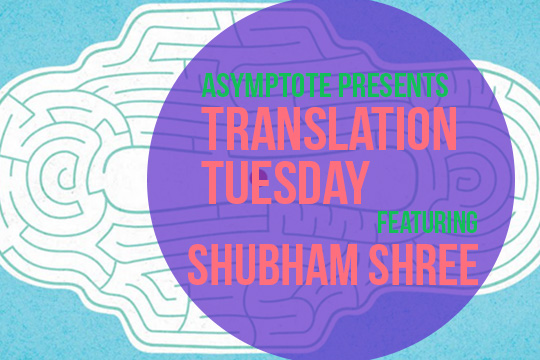Our Winter 2017 issue, hot off the presses yesterday, celebrated our six years of publishing world literature with new work from 27 countries by authors such as Colm Tóibín, Cesare Pavese and Monika Rinck, alongside a Special Feature on Indian poetry focusing on marginalized voices. Here, via acclaimed translator Daisy Rockwell, we present two works from this Special Feature by 2016 Bharat Bhushan Agrawal Prize winner Shubham Shree—who recently caused great controversy with her bold use of slang and English words, considered a desecration of the tradition of Hindi poetry.
My Boyfriend
(An essay proposed for the Grade Six Moral Education Curriculum)
My boyfriend is a two-legged boy human
He has two hands, two feet, and one tail
(Note—I’m the only one who can see his tail)
My boyfriend’s name is Honey
At home, he’s Babloo, on his notebooks, Umashankar
His name is also Baby, Sweetie-pie, and Darling
I call my boyfriend Babu
Babu also calls me Babu
Babu has dandruff in his hair
Babu crunches when he eats
Babu slurps when he drinks
When he’s annoyed he packs a 440 volt punch
He has vaccine scars on his arms, twin half-lemons
If you poke them he screams
My Babu also cries
in a hiccupy sort of way
And he laughs with his eyes closed
He loooves salty food
When he sleeps, he snores from his nose and mouth
I am a good girlfriend
I swat away the flies trying to sneak into his mouth
I even smacked a mosquito on his belly
I always start laughing when I see him
He has very nice cheeks
If you stretch them out they get five centimeters bigger
He gave me a teddy bear named Kitty
We are the world’s best couple
Our anniversary is the 15th of May
Please congratulate us
*What we learn from my boyfriend
Is that you should smack mosquitos on your boyfriend’s belly
And swat flies away from his mouth
My Hostel Cleaner Has Refused to Throw Away Sanitary Napkins
It’s nothing new
There’s a long tradition
of hating menstruation
Within this Lakshman Rekha
of ‘impurity’—
this invisible border—
half the population is imprisoned
So often
those mysterious sanitary napkin ads
make us behave strangely…
They’re bought and sold
with awkward bashful smiles
And after use
they become
the world’s most hated objects
Not just the sanitary napkins
their sisters-in-utility as well
Old rags
End of sari
Scrap of dupatta
When they lie along the road
Boys mock
Girls blush
These cast-off friends of ours
destined not even for the trashcan
in a home
cursed are they
exiled far from all eyes
If they ever come into view
They’re stared at so
An instrument for measuring
the depth of those stares
has yet to be invented
Their crime perhaps is
to quietly soak up
the womb’s fruit—now rotted
Or maybe it is that
in praise of menstruation
our ancestors wrote no verse
as they did in praise of semen
I know this poem is really weak—
just like a menstruating woman
but what to do
What I don’t understand is
underwear holding semen
finds a special place on the clothesline
It’s ‘pure’ the moment it’s washed
What’s thrown in some
anonymous corner
is the clothing wet with blood
that emerged from some vagina
with utmost pain and anguish
My hostel cleaner has refused
to dispose of sanitary napkins
There’s an intellectual dispute afoot
Are they better wrapped in newspaper?
Covered up so nothing shows?
They should be disposed of neatly
in the trash
They shouldn’t be left
uncovered here and there
Who knows why
somehow I just can’t hear
that cleaner’s refusal
Verses of semen praise
echo in my ears
Translated from the Hindi by Daisy Rockwell
For each of the next few weeks at the blog, we will be showcasing a new Indian poet, in addition to the nine already featured in our Indian Poetry Feature, which you can find in our new issue now. Happy reading!
Daisy Rockwell is a painter, translator, and writer who lives in the U.S. She has published many translations from Hindi, including Bhisham Sahni’s Tamas and Upendranath Ashk’s Falling Walls (both from Penguin India).
Shubham Shree was born in 1991 and lives in Delhi, India. Her controversial poem “Poetry Management” was awarded the prestigious Bharat Bhushan Agrawal Prize in 2016.
*****
Read More Translations:

